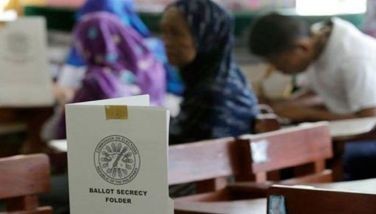DOJ to file coup raps vs Gringo
April 20, 2004 | 12:00am
The Supreme Court (SC) dismissed yesterday for lack of merit a petition of Sen. Gregorio Honasan questioning the jurisdiction of the Department of Justice (DOJ) over the coup d’etat charges filed against him.
This developed as Chief State Prosecutor Jovencito Zuño said the DOJ prosecution panel will now proceed with the preliminary investigation of the case filed against Honasan by the Philippine National Police (PNP) in connection with the mutiny launched by junior military officers in July last year.
The prosecutors suspended the investigation pending the SC’s resolution of Honasan’s petition.
Zuño said the preliminary investigation is nearly complete and it will soon be known if there is probable cause to indict Honasan.
In a 26-page decision penned by Justice Ma. Alicia Austria-Martinez, the SC said the Constitution, the Ombudsman Act of 1989, Administrative Order No. 8 of the Office of the Ombudsman, the prevailing jurisprudence, and the Revised Rules on Criminal Procedure all recognize and uphold the concurrent jurisdiction of the Ombudsman and the DOJ to conduct preliminary investigation of charges filed against public officers and employees.
Voting 9-5, the high tribunal said the power to investigate or conduct preliminary investigation on charges against any public officer or employee may be exercised by an investigator or any provincial or city prosecutor or their assistants, either in their regular capacity or as prosecutors deputized by the Ombudsman.
The SC added the fact that all prosecutors are deputized by the Ombudsman under a joint circular by the DOJ and the Ombudsman is a superfluity.
Those who concurred in the decision were Chief Justice Hilario Davide Jr. and Justices Artemio Panganiban, Antonio Carpio, Renato Corona, Conchita Carpio-Morales, Romeo Callejo Sr., Adolfo Azcuna and Dante Tinga.
The justices who dissented were Justices Reynato Puno, Jose Vitug, Leonardo Quisumbing, Consuelo Ynares-Santiago and Angelina Sandoval Gutierrez.
The high tribunal said the DOJ panel need not be authorized or deputized by the Ombudsman to conduct a preliminary investigation for complaints filed before it.
The SC explained that the DOJ’s authority to act as the principal law agency of the government and investigate the commission of crimes under the Revised Penal Code is derived from the Revised Administrative Code, which had been held in a landmark case as not contrary to the Constitution.
"Thus, there is not even a need to delegate the conduct of the preliminary investigation to an agency which has the jurisdiction to do in the first place," the SC said. "However, the Ombudsman may assert its primary jurisdiction at any stage of the investigation."
The Ombudsman supported the DOJ, saying the prosecutors also have the authority to conduct an investigation into the cases of public officials.
Honasan argued before the SC that the DOJ should transfer the case to the Ombudsman, which has jurisdiction over his case since he is a public officer with salary grade 31.
He also said the charges against him fall exclusively within the jurisdiction of the Sandiganbayan.
Honasan said the case against him is related to his office as he was merely promoting his National Recovery Program, which was used by the PNP-Criminal Investigation and Detection Group (CIDG) as evidence to pin him down.
But the SC said the question of the Sandiganbayan’s jurisdiction will not be resolved so as not to preempt the result of the investigation being conducted by the DOJ panel.
The SC also refused to rule on the existence of probable cause to warrant the filing of charges against Honasan, and on which court the charges should be filed due to the presence of other respondents in the complaint.
Public officials as well as military and police officers who act to overthrow the current administration can be charged with coup d’ etat while civilians face rebellion charges.
Aside from Honasan, the PNP-CIDG named in its complaint before the DOJ Ernesto Macahiya, retired Capt. Felix Turingan and retired military Colonels Virgilio Briones and Romeo Lazo of the Philippine Guardians Brotherhood Inc.
Also charged were two of Honasan’s staff — George Duldulao and Lina Reyes — and about 1,000 John and Jane Does as supporters.
Honasan allegedly led meetings with the leaders of the military officers and enlisted personnel who staged the mutiny in the Oakwood Premier apartments in Makati City last July 27.
Witnesses said Honasan instigated the attempt to topple the Arroyo administration and even had a "blood compact" with the soldiers, who also distributed pamphlets on Honasan’s program during the mutiny. The pamphlets contained supposed solutions to corruption and abuses in government.
This developed as Chief State Prosecutor Jovencito Zuño said the DOJ prosecution panel will now proceed with the preliminary investigation of the case filed against Honasan by the Philippine National Police (PNP) in connection with the mutiny launched by junior military officers in July last year.
The prosecutors suspended the investigation pending the SC’s resolution of Honasan’s petition.
Zuño said the preliminary investigation is nearly complete and it will soon be known if there is probable cause to indict Honasan.
In a 26-page decision penned by Justice Ma. Alicia Austria-Martinez, the SC said the Constitution, the Ombudsman Act of 1989, Administrative Order No. 8 of the Office of the Ombudsman, the prevailing jurisprudence, and the Revised Rules on Criminal Procedure all recognize and uphold the concurrent jurisdiction of the Ombudsman and the DOJ to conduct preliminary investigation of charges filed against public officers and employees.
Voting 9-5, the high tribunal said the power to investigate or conduct preliminary investigation on charges against any public officer or employee may be exercised by an investigator or any provincial or city prosecutor or their assistants, either in their regular capacity or as prosecutors deputized by the Ombudsman.
The SC added the fact that all prosecutors are deputized by the Ombudsman under a joint circular by the DOJ and the Ombudsman is a superfluity.
Those who concurred in the decision were Chief Justice Hilario Davide Jr. and Justices Artemio Panganiban, Antonio Carpio, Renato Corona, Conchita Carpio-Morales, Romeo Callejo Sr., Adolfo Azcuna and Dante Tinga.
The justices who dissented were Justices Reynato Puno, Jose Vitug, Leonardo Quisumbing, Consuelo Ynares-Santiago and Angelina Sandoval Gutierrez.
The high tribunal said the DOJ panel need not be authorized or deputized by the Ombudsman to conduct a preliminary investigation for complaints filed before it.
The SC explained that the DOJ’s authority to act as the principal law agency of the government and investigate the commission of crimes under the Revised Penal Code is derived from the Revised Administrative Code, which had been held in a landmark case as not contrary to the Constitution.
"Thus, there is not even a need to delegate the conduct of the preliminary investigation to an agency which has the jurisdiction to do in the first place," the SC said. "However, the Ombudsman may assert its primary jurisdiction at any stage of the investigation."
The Ombudsman supported the DOJ, saying the prosecutors also have the authority to conduct an investigation into the cases of public officials.
Honasan argued before the SC that the DOJ should transfer the case to the Ombudsman, which has jurisdiction over his case since he is a public officer with salary grade 31.
He also said the charges against him fall exclusively within the jurisdiction of the Sandiganbayan.
Honasan said the case against him is related to his office as he was merely promoting his National Recovery Program, which was used by the PNP-Criminal Investigation and Detection Group (CIDG) as evidence to pin him down.
But the SC said the question of the Sandiganbayan’s jurisdiction will not be resolved so as not to preempt the result of the investigation being conducted by the DOJ panel.
The SC also refused to rule on the existence of probable cause to warrant the filing of charges against Honasan, and on which court the charges should be filed due to the presence of other respondents in the complaint.
Public officials as well as military and police officers who act to overthrow the current administration can be charged with coup d’ etat while civilians face rebellion charges.
Aside from Honasan, the PNP-CIDG named in its complaint before the DOJ Ernesto Macahiya, retired Capt. Felix Turingan and retired military Colonels Virgilio Briones and Romeo Lazo of the Philippine Guardians Brotherhood Inc.
Also charged were two of Honasan’s staff — George Duldulao and Lina Reyes — and about 1,000 John and Jane Does as supporters.
Honasan allegedly led meetings with the leaders of the military officers and enlisted personnel who staged the mutiny in the Oakwood Premier apartments in Makati City last July 27.
Witnesses said Honasan instigated the attempt to topple the Arroyo administration and even had a "blood compact" with the soldiers, who also distributed pamphlets on Honasan’s program during the mutiny. The pamphlets contained supposed solutions to corruption and abuses in government.
BrandSpace Articles
<
>
- Latest
- Trending
Trending
Latest
Trending
Latest
Recommended

































